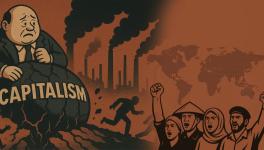Global Deal on Climate Change in 2010 'All but Impossible'
"The forces trying to tackle climate change are in disarray, wandering in small groups around the battlefield like a beaten army," said a senior British diplomat.
An important factor cited is an impasse within the UN organisation charged with delivering a global deal, which today will start assessing the pledges made by individual countries by a deadline that passed last night.
Many of those contacted say only a legally binding deal setting "top-down" global limits on emissions can ultimately avoid the worst impacts of rising temperatures. But a global deal at the next major climate summit in Mexico is impossible, says the former deputy prime minister John Prescott, now the Council of Europe's rapporteur on climate change. "I don't care if it's government ministers or NGOs, if they think you can get a legal agreement all signed up by November in Mexico, I don't believe it."
Similar opinions are being expressed worldwide. "In 2010 perhaps we'll manage some success, but I think a definitive deal is very difficult," said Suzana Kahn, a key negotiator in Copenhagen and Brazil's national secretary for climate change.
The change in rhetoric compared with just weeks ago is stark. On the eve of the Copenhagen summit last year, Gordon Brown wrote in the Guardian: "Our aim is a comprehensive and global agreement which is then converted to an internationally legally binding treaty in no more than six months."
The British government says the 12-paragraph Copenhagen accord "noted" by the UN summit last month provides the basis for significant country-by-country carbon cuts. But even the climate secretary, Ed Miliband, acknowledges this "bottom-up" approach is unlikely to be sufficient. "Will they on their own be enough? Perhaps not, which is why we need to ratchet those targets up," he said.
One of the most senior British climate officials told the Guardian that a legally binding deal, while desirable, was now no longer the critical thing: "What people seem to forget is that an agreement does not reduce one molecule of carbon dioxide – it's national policies that do that."
The shift of emphasis from a global deal to national action stems directly from the problem that wrecked the Copenhagen summit, and which remains unresolved. The UN framework convention on climate change (UNFCCC), the secretariat for climate treaties, makes decisions by unanimous agreement of all 192 member countries, and was described as "fatally cumbersome" by one close observer.
The small group of countries that devised the Copenhagen accord, led by the US, China and India and including the UK, want 20-30 representative nations to be able to make decisions and other organisations such as the G20 and the Major Economies Forum to take a role. But this will be fiercely resisted by countries such as Bolivia and Sudan, which blocked agreement in Copenhagen, and Tuvalu and other threatened states which want to retain a veto on deals they see as weak.
Get the latest reports & analysis with people's perspective on Protests, movements & deep analytical videos, discussions of the current affairs in your Telegram app. Subscribe to NewsClick's Telegram channel & get Real-Time updates on stories, as they get published on our website.
























